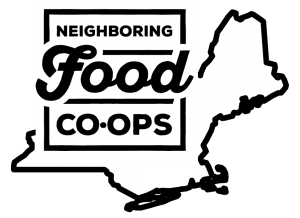 Your Neighboring Food Co-ops
Your Neighboring Food Co-ops
Locally Owned by More Than
150,000 People Like You!
In this Month’s E-News, check out:
- Go Co-op for the Holidays
- Welcome, Cambridge Food Co-op!
- What’s the Best Path to Employee Ownership?
- Farm to Freezer: Warm Winter Blueberries
- December’s Cave to Co-op Cheese Special
- Farmers Union: Thank you, Roger Johnson
- Our Neighborhood Co-op Calendar
As we gather to celebrate the holidays together, consider gift giving and special foods that help build a more healthy, just, and sustainable food system and a stronger local economy!
Your local food co-ops offer many options, including:
- Special Holiday Foods and Beverages and all of the ingredients you need for holiday celebrations like these great ideas from Middlebury Natural Foods Co-op.
- Make your own gift basket filled with Locally Made items or Personalized Themes for everyone on your list like these suggestions from Morrisville Food Co-op and GreenStar Food Co-op’s Gift Guide.
- Can’t decide what to get your loved ones? Give the gift of co-operation with a co-op gift card or a membership in your local food co-op or start-up!
However you choose to celebrate this season, you can find all of the ingredients you need for a joyous time with friends and family — and a more inclusive and sustainable community — at the co-op!
To find a food co-op near you, please visit https://nfca.coop/members.

Thanks to CoBank for their support of our Neighboring Food Co-ops
Welcome, Cambridge Food Co-op!
The Neighboring Food Co-op Association is proud to welcome Cambridge Food Co-op as our newest member!
We are excited to welcome Cambridge Food Co-op (Cambridge, NY) as our 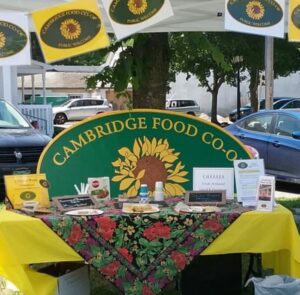 newest member of the Neighboring Food Co-op Association (NFCA)! The Cambridge Food Co-op has served the communities of the Battenkill valley in New York for more than 40 years, with a spirit of respect for their community and our world.
newest member of the Neighboring Food Co-op Association (NFCA)! The Cambridge Food Co-op has served the communities of the Battenkill valley in New York for more than 40 years, with a spirit of respect for their community and our world.
Close to a third of their products come from local or regional suppliers, supporting farmers and small businesses throughout our area. To help sell these amazing products, the Co-op relies on a robust working member program, and the support of member and non-member shoppers and community partners alike. Because of this support, the Cambridge Food Co-op truly is, “the little co-op that could.”
“The Cambridge Food Co-op is thrilled to be a part of the Neighboring Food Co-op Association,” said Kathleen Quinn, Director of Member & Community Relations. “NFCA’s professional guidance, training, advocacy, and resources will prove invaluable to our Co-op as we position ourselves for future success. Thanks, NFCA!”
The NFCA includes almost 40 food co-ops and start-ups across New England that are working together toward a vision a thriving co-operative economy, rooted in a healthy, just and sustainable food system and a vibrant community of co-operative enterprise. For a map of your Neighboring Food Co-ops, please visit https://nfca.coop/members
Now Offering Personal Impact Deposit Accounts

Open an account today and help increase access to local, healthy food, deliver health care to more people, create affordable housing and build renewable energy. Your Choices Reflect Your Values. Your Bank Should Too. Check our rates and Open an Account today.
What’s the Best Path to Employee Ownership? Depends on Your Long-Term Goal.
New Belgium Brewing has been promoted as a model for employee ownership. So what should we make of its sale to a multinational corporation?
The recent sale of Colorado-based New Belgium Brewing, formerly owned by 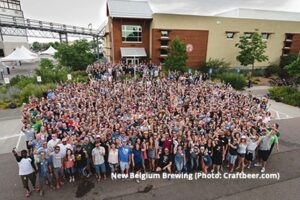 an Employee Stock Ownership Plan (ESOP), to Japanese multinational Kirin Holdings offers an opportunity to consider the unique aspects of ESOPs and worker co-ops and what these models offer to a vision for a more inclusive, resilient, and democratic economy. It also provides a framework for understanding some of the key differences between co-operative enterprise in general and investor-based models of ownership.
an Employee Stock Ownership Plan (ESOP), to Japanese multinational Kirin Holdings offers an opportunity to consider the unique aspects of ESOPs and worker co-ops and what these models offer to a vision for a more inclusive, resilient, and democratic economy. It also provides a framework for understanding some of the key differences between co-operative enterprise in general and investor-based models of ownership.
In ESOPs, capital remains the driving force with increased access to stock ownership for employees and growth in share value as the primary goal. The enterprise itself is a commodity with stock valued according to the market — what the business could be sold for at a given moment. In this context, the sale of New Belgium, or any ESOP, is the logical outcome of a model designed to distribute capital gains among workers. There is a built-in incentive for employee-investors to sell when share value is high or when access to financial capital is needed. Because votes are based on stock ownership, as in other investor-owned firms, senior employee-investors with the most to gain from a sale have the most say in such a decision.
Co-operative businesses, by contrast, are designed for the ongoing use of the enterprise by members (usus-fructus property rights), rather than their right to sell assets. Capital is treated as a means to an end rather than an end in itself, with surplus (or profit) returned to worker-members on the basis of their labor. Asset locks, indivisible reserves, and other mechanisms incentivize operation of the co-op as a multigenerational asset. Governed on the basis of one member, one vote, worker co-ops focus on employee empowerment, job retention, and control over one’s work life.
On a related note, most food co-ops are organized around the interests of members as consumers and generally focus on access to healthy, affordable food, sustainability, and growing the local economy, and providing good jobs. On an individual level, members purchase a share that gives them the right to participate in governance, and benefit from any surplus based on their use of the business (in this case, their purchases). But they do not “own” the co-op as an individual and can only sell their share back to the co-op. In this sense, ownership is on the collective level by people who actively use the co-op, rather than investors. Employees can also be members, and a recent survey by the Neighboring Food Co-op Association found that 60% of food co-op employees in our region — about 1,400 people — are members of their co-op, sharing ownership in their local grocery store.
We therefore need a new vocabulary or, maybe, just a proper use of existing terms. While both co-ops and ESOPs are often included under the umbrella of “employee ownership,” this term has been largely appropriated by conventional economic thought that places the right to dispose of property at the center of ownership rights. This obscures alternatives such as co-operatives that are based on the right of members to use the enterprise for long-term employment, social purpose, and economic development. Like other co-operatives, worker co-ops are “owned” by user-members—in this case, the people who actively work within the firm—but not in the conventional sense of the individual’s right to buy and sell property. Rather, collective ownership and decision-making is more akin to citizenship in an economic democracy.
This week’s shareholder vote approving the sale of New Belgium Brewing is an indication that the interests of the current generation of employee-investors overrode long-term employment and social concerns. In this context, the sale can be considered a success in that it represents substantial capital gains for shareholders. However, if the goal of employee ownership was to root jobs, infrastructure, and social impact in the community over time, the co-operative model would have been a better choice.
Erbin Crowell is executive director of Neighboring Food Co-op Association and chair of the National Cooperative Business Association, CLUSA International (NCBA CLUSA). Sonja Novkovic is a professor at the International Center for Co-operative Management, Saint Mary’s University, and a member of the Council of Co-operative Economists at NCBA CLUSA.
This article was adapted from an earlier version originally published online by the Democracy Collaborative’s Fifty by Fifty initiative.
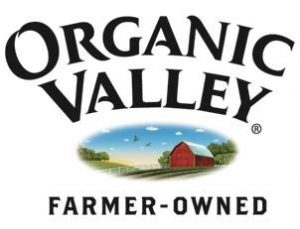
Thanks to Organic Valley for their support of our Neighboring Food Co-ops
Farm to Freezer: Warm Winter Blueberries
…with Northeast Grown Blueberries
Blueberries are fantastic in smoothies, jam, and fresh but how about for the cold weather months as a warm blueberry soup? Blåb ärssoppa is Swedish for Blueberry (or Bilberry) Soup and traditionally served hot or cold, depending on the season and is known for being served during Vasaloppet – the world’s oldest, longest, and biggest cross-country ski race that takes place in Sweden. Even if you are not out trekking in the snow but would like to enjoy a warming, tasty, easy to make soup give Blåbärssoppa a try!
ärssoppa is Swedish for Blueberry (or Bilberry) Soup and traditionally served hot or cold, depending on the season and is known for being served during Vasaloppet – the world’s oldest, longest, and biggest cross-country ski race that takes place in Sweden. Even if you are not out trekking in the snow but would like to enjoy a warming, tasty, easy to make soup give Blåbärssoppa a try!
Blueberries are high in antioxidants, a good source of fiber, manganese and vitamins C and K. What’s not to love about this simple fruit! Your co-op has the ingredients you need for making simple, nutritious, and creative meals for your family. Holiday celebrations or every day, keep warm with recipes using Neighboring Food Co-op Association frozen blueberries or vegetables.
Bringing Northeast grown fruits and vegetables to you through your co-op is a part of NFCA’s vision of a thriving co-operative economy, rooted in a healthy, just, and sustainable food system and a vibrant community of co-operative enterprise.
Numerous variations can be found for Blabarssoppa: Blueberry Soup, but here is a basic one to get you started. The soup can be made in advance and just reheated in the morning or evening.
Blabarssoppa: Blueberry Soup
2-3 servings
Ingredients
- 1 10 oz frozen NFCA blueberries pkg (2 cups)
- 2 tablespoons maple syrup (more or less to taste)
- 1/4 teaspoon ground cardamom
- 1/4 teaspoon ground cinnamon (or 1 small cinnamon stick)
- 1 1/2 cups water
- ¼ small lemon wedge
Directions
In a non-reactive saucepan, bring the blueberries, maple syrup, cardamom, cinnamon, lemon wedge and water to a boil over medium heat for about 7 minutes.
Remove lemon and cinnamon stick, strain blueberry mixture into a bowl, pressing down on the pulp to extract as much liquid as possible (discard lemon and blueberry pulp).
Serve hot or chilled. Goes well topped with a spoonful of Greek yogurt or whipped cream. Can be cooled and refrigerated for up to three days.
For more Farm to Freezer information and recipes visit: www.nfca.coop/farmtofreezer.

Thanks to Associated Buyers for their support of our Neighboring Food Co-ops
December’s Cave to Co-op Cheese Special
Goat Cheddar, Boston Post Dairy, Enosburg, Vermont
Boston Post Goat Cheddar is made with their own Vermont farmstead goat 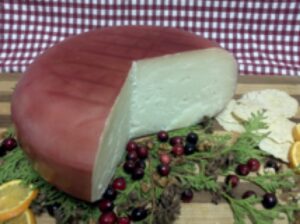 milk and has a smooth creamy texture and a sweet nutty flavor with a lovely goat tang finish.
milk and has a smooth creamy texture and a sweet nutty flavor with a lovely goat tang finish.
Boston Post Dairy, named for the old road that runs through the property, is located on the Gervais Family Farm, a family run farm in northern Vermont owned and operated by Robert and Giselle Gervaise and their children. The Gervaise family has been farming the property since 1962 and in 2007 they bought the Boston Post Dairy, adding a cheese making facility along with a small retail store where they sell their cheeses, goat milk soaps, maple syrup and bakery items, all made at the farm. The cheese room was made with viewing windows to allow visitors to watch the cheese making process.
In 2013 their farm was given the prestigious Vermont Dairy Farm of the Year award, an honor recognizing outstanding, efficiently managed dairy enterprises and for setting a strong example for other farmers to follow. Farms are evaluated on a number of criteria, including production records; herd, pasture, and crop management; environmental practices; contributions to agriculture and the local community and overall excellence in dairying.
Boston Post Dairy’s Goat Cheddar is handcrafted in small batches using pasteurized goat milk, aged for four months and has a thin paracoat rind. This Goat Cheddar is a great addition to a holiday cheese platter or used in your favorite recipe calling for a mild cheddar. For recipes using this month’s Cave to Co-op featured cheese see: https://nfca.coop/cave-to-co-op-december-2019/
Cave to Co-op is a partnership between Provisions International and the Neighboring Food Co-op Association (NFCA) to support artisanal cheese producers in our region and make their products more easily available to co-op shoppers. Each month, a delicious local cheese is featured at a great price.
For more information on Cave to Co-op, visit: www.nfca.coop/CaveToCo-op

Thanks to New England Farmers Union for their support of our Neighboring Food Co-ops
Farmers Union: Thank you, Roger Johnson
After serving as president of National Farmers Union (NFU) for over a decade, Roger Johnson announced that he does not intend to seek reelection again next year.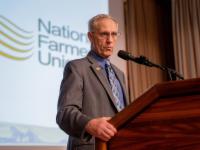
His current term will end at the organization’s annual convention in March, at which point an election for his successor will be held.
“Roger Johnson has been a lifelong advocate for economic, environmental and social justice for farmers, farmworkers and their communities,” said Roger Noonan, President of the New England Farmers Union. “His vision and leadership were instrumental in the development of the New England Farmers Union and his counsel and support invaluable as we elevated issues critical to New England’s farm and food scene to the national level. We wish him and Anita the very best.”
Johnson has also been an advocate for co-operative business and for closer collaboration among farmers and consumers in supporting food system policy that works for everyone, and served as keynote speaker for the Neighboring Food Co-op Association’s Fall Member Gathering at Hanover Co-op Food Stores in 2011.
During his eleven-year-long tenure, Johnson has led efforts to fight corporate consolidation in the agriculture industry, help farmers adapt to and mitigate climate change, develop fair international trade agreements, provide information and resources to rural communities struggling with mental health issues and opioid misuse, and ensure the economic and social viability of family farm agriculture. Prior to leading the family farm organization, he served as North Dakota Agriculture Commissioner and as president of the National Association of State Departments of Agriculture (NASDA).
Johnson, a third-generation family farmer from Turtle Lake, North Dakota, grew up in Farmers Union, participating in the organization’s youth programs and serving as a county president and chairman of the board of a local Farmers Union co-operative. He released the following statement about his impending retirement:
“Farmers Union has been a fundamental part of my identity for my entire life – and it has been my greatest honor to serve this organization and the admirable farmers and ranchers who comprise its membership. It’s a bittersweet feeling to take a step back from this career-defining role, but ultimately, it’s time for me to spend more time with my wife and four grandchildren.
“My top priority, as president and now during this transition process, is to protect the future of family farmers and rural communities, and I am confident that National Farmers Union is well positioned to keep doing just that. Compared to where we were eleven years ago, today we are more financially secure, our membership is growing, and we have built our reputation as a leader for progressive agriculture – all thanks to our highly capable and dedicated team. My decision will change none of these things. While I enjoy my quiet retirement, I am sure that Farmers Union staff and members will continue the organization’s 117-year-long mission to build a better, more sustainable, and more equitable food system.”
* * * *
The New England Farmers Union Needs You!
If you care about where your food comes from and want to support the people who produce it, consider joining NEFU as a Friend of the Farmer for just $15. Your membership will help ensure that our region’s producers and consumers are heard by policy makers here at home and in Washington, DC. For more information, please visit www.newenglandfarmersunion.org.
Our Neighborhood Co-op Calendar
33rd NOFA/Mass Winter Conference
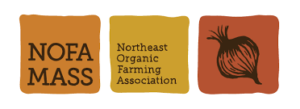 Saturday, 11 January 2020
Saturday, 11 January 2020
Worcester State University
Worcester , MA
The keynote for the 33rd NOFA/Mass Winter conference will be the award-winning journalist Carey Gillam. Gillam is a former senior correspondent for Reuter’s international news service and veteran journalist with over 25 years of experience covering American corporations and agribusiness.
Our Neighboring Food Co-ops are proud to sponsor NOFA/Mass as part of our vision for a healthy, just and sustainable food system.
If you are a member of an NFCA Member Food Co-op, you can receive a 20% discount on conference registration with the code CoOp2020!
For More Co-op Events, Visit https://nfca.coop/calendar
DECEMBER 2019
Dec 21
175th Anniversary of the founding of the Rochdale Society of Equitable Pioneers, 1844.
JANUARY 2020
Sat, Jan 11
NOFA MASS Winter Conference (Sponsored by NFCA)
https://www.nofamass.org/events/wc
Thurs-Sun, Jan 17-19
NOFA NY Winter Conference
https://nofany-winterconference.squarespace.com/
FEBRUARY 2020
Sat, Feb 8
NOFA NH Winter Conference (Sponsored by NFCA)
https://www.nofanh.org/winterconference
Sat-Mon, Feb 15-17
NOFA VT Winter Conference (Sponsored by NFCA)
MARCH 2020
Sat, Mar 7
NOFA CT Winter Conference
https://organiconn.squarespace.com/
Mar 21
9th Annual Meeting of the Neighboring Food Co-op Association (NFCA)
Join us for full day of presentations, workshops, and networking for member food co-op board members & staff.
OCTOBER 2020
Sat, OCT 17
Columinate Co-op Cafe (Co-Hosted by NFCA)
https://columinate.coop/upcoming_events/co-op-cafe-new-england/
The Neighboring Food Co-op Association (NFCA) is a co-operative federation of 35 food co-ops and start-up initiatives across New England, working together toward a shared vision of a thriving co-operative economy, rooted in a healthy, just, and sustainable food system and a vibrant community of co-operative enterprise.

